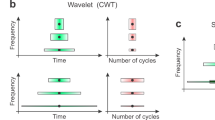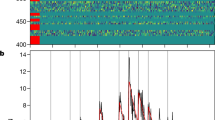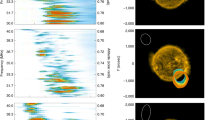Abstract
IN the radio-frequency spectrum, solar radio bursts have been classified according to their dynamic structure. Information on the velocity of shock waves or the solar corpuscular stream as well as on the physical mechanism of the radiation has been obtained by this recording method. Another technique for studying the mechanism of solar radio radiation is to observe the modulation structure of bursts and the quiet Sun at discrete frequencies. Jager and Veer1 studied solar radio transients by recording 200 Mc./s. radio noise on fast paper tape. Their observations were concerned with the time duration and distribution of radio-pips, their bandwidth and the presence of the echo phenomena.
This is a preview of subscription content, access via your institution
Access options
Subscribe to this journal
Receive 51 print issues and online access
$199.00 per year
only $3.90 per issue
Buy this article
- Purchase on Springer Link
- Instant access to full article PDF
Prices may be subject to local taxes which are calculated during checkout
Similar content being viewed by others
References
Jager, C. de, and Veer, F. Van't, I.A.U. Symp., No. 4 (August 1955).
Author information
Authors and Affiliations
Rights and permissions
About this article
Cite this article
AARONS, J., BASU, S., KIDD, W. et al. Very-Low-Frequency Modulation of Discrete Frequency Solar Noise Bursts. Nature 191, 56–57 (1961). https://doi.org/10.1038/191056a0
Issue Date:
DOI: https://doi.org/10.1038/191056a0
This article is cited by
-
Quasi-periodic variations in solar radio emission at 3.3 cm
Radiophysics and Quantum Electronics (1968)
Comments
By submitting a comment you agree to abide by our Terms and Community Guidelines. If you find something abusive or that does not comply with our terms or guidelines please flag it as inappropriate.



